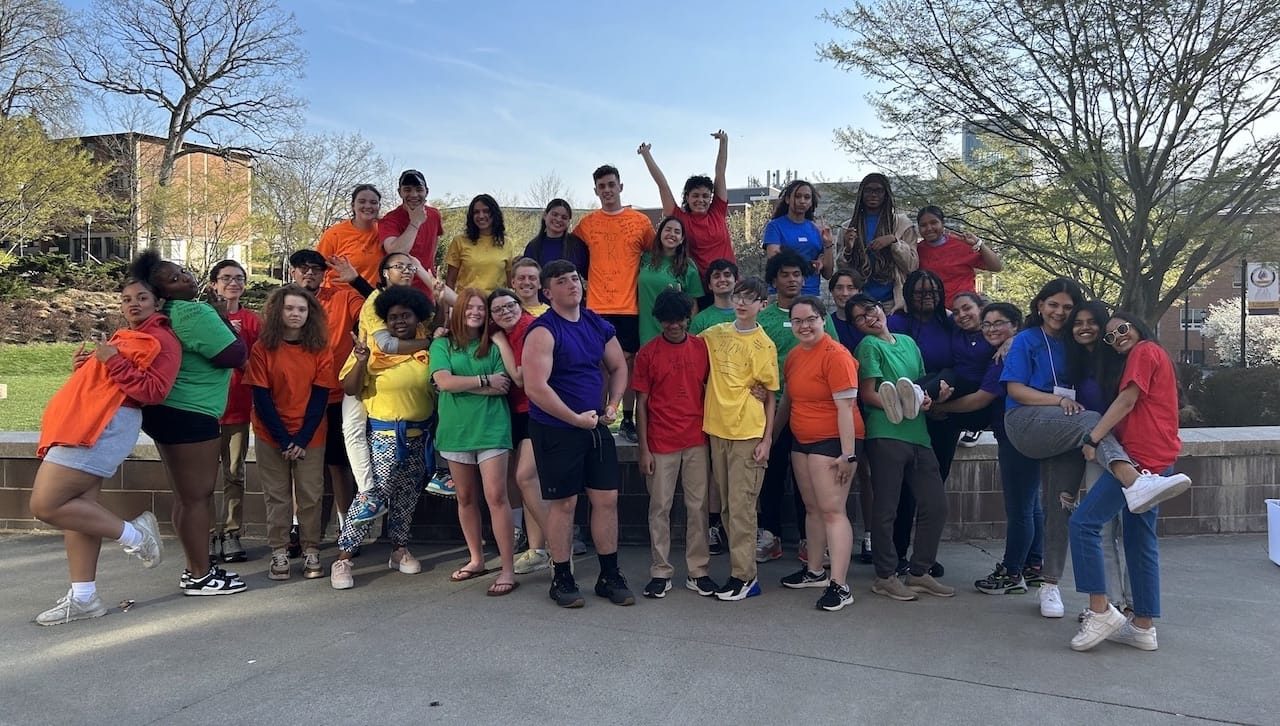Students Complete SMART Mentoring Program

A little bit of timely, focused mentorship can make a huge difference in a young person’s life, as The University of Scranton’s Meg Cullen-Brown SMART (Scranton Mentors Actively Reaching Teens) program continues to prove year after year.
This year’s SMART program paired 18 University student mentors with 26 student mentees from Scranton and West Scranton high schools for six weeks of knowledge- and character-building sessions. The goal is to help the mentees establish a strong relationship with college students who can model the advantages of performing well in school and attending college, which in turn can lead to a boost in their overall self-confidence.
SMART started in 2012 and was renamed in 2017 in honor of Meg Cullen-Brown, a beloved former University administrator who passed away in 2016. The program’s funding comes via a memorial fund established by her family and friends.
Patricia Vaccaro, director of the University’s Center for Service and Social Justice, came up with the concept for SMART, believing it could greatly benefit high school students with high academic ability whose life circumstances might be inhibiting their future prospects.
Numerous studies have shown that students who forge meaningful relationships with a mentor improve their chances of academic success.
“I’m always looking to develop service programs that both bring community to us and allow us to go out in the community,” Vaccaro said. “With SMART, we thought it would be great to bring to the campus kids who might not otherwise have the opportunity to walk onto a college campus. For some of them, college might not even be a goal.”
“We had a very culturally diverse group of mentees this year,” Vaccaro continued. “These are kids who could easily fall through the cracks, so they can really benefit from the program.”
This year marked SMART’s return to the campus after being put on pause by the COVID-19 pandemic. As always, the University student mentors spent weeks training with staff members and graduate students before embarking on the program.
Every Friday for six weeks, the mentors and mentees met on campus and spent several hours engaged in fun, interactive exercises geared around an array of topics, including enhancing communication skills, building healthy relationships, confronting bullies/cyber bullies, overcoming obstacles, and understanding self-worth.
“We focus on the strengths of the kids and try to help them identify their gifts and talents,” Vaccaro said. “We put a lot of emphasis on self-image, which is so crucial given self-esteem among teens is now at an all-time low, especially in the wake of COVID.”
Erin Grell, a student in the University’s Occupational Therapy master’s program, served as graduate assistant and coordinator of SMART this year. As she sees it, the program is mutually beneficial.
“It gives our University students the chance to use their own lived experiences to serve as role models and share and learn from the high school mentees,” Grell said. “Although the program is considered a mentorship program, the mentors and mentees are truly in kinship with one another. Over the course of the program, they guide one another, learn from each other, and lift one another up – it’s a two-way street.”
Janvee Patel, a senior healthcare administration major and business administration minor at the University, was first exposed to SMART as a high school student. Her experience as a mentee was “life-changing,” making the decision to return as a mentor an easy one.
“It made me confident, and most importantly, comfortable with who I am. As soon as I finished the program, I knew that I wanted to become a mentor and hopefully make the same impact on my mentees,” Patel said. “I am so glad I got to have a full-circle moment and experience this program in its entirety and get to know my mentees. All these students are a bright group who have their own set of gifts and talents that will get them to big places in life. I really hope that this program helped them realize the potential they all have.”
“While I knew I would benefit from the mentoring experience by strengthening my interpersonal and leadership skills, it is the unexpected benefits that I reflect on,” added fellow mentor Conor Dougherty, a senior neuroscience and philosophy major. “Because of these students’ willingness to share their opinions and experiences, I gained new perspectives and am more socially conscious of their socio-economic challenges.”
For Vaccaro, the best part of the program is the closing ceremony, which is attended by the students’ families. There, the mentees receive a free Google Chromebook and get to offer testimonials about how much they’ve grown from the experience.
“Just to see how much they change over the six weeks is incredible for me,” Vaccaro said. “I’m just grateful we can offer something like this to the community. Our students get so much out of it, and I really think it makes so much of a difference to the high school students.”
“The program has reminded me of the importance of loving and appreciating others for who they are,” Grell added. “When we are authentically ourselves, we can make the world a better place together.”






